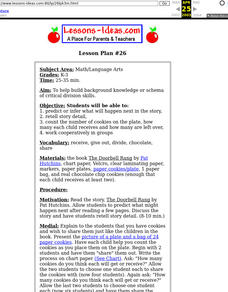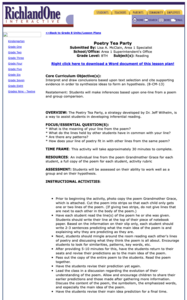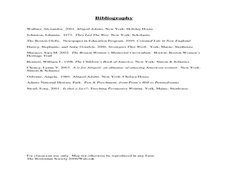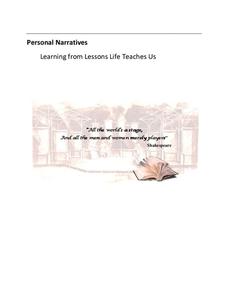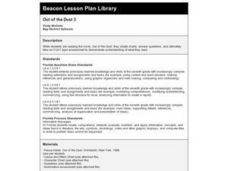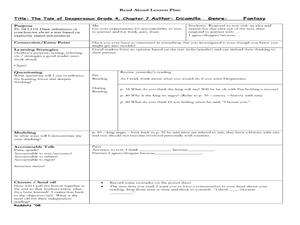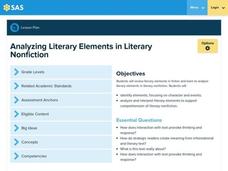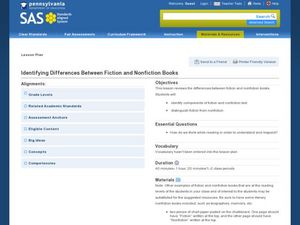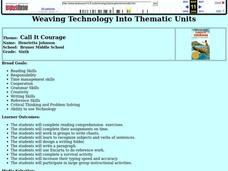Curated OER
Lesson Plan #26
Students build background knowledge or schema of critical division skills by predicting or inferring what will happen next in the story, retelling story detail, and counting the number of cookies on the plate.
Curated OER
Poetry Tea Party
Studetns make inferences based upone one-line poetry and group comparison. In this poetry lesson, 9th graders read strips from a poem and write prediction sentences for the poem. Students read each other's poetry lines and then read the...
Curated OER
Biographies
Students read a biography and discuss what defines a biography. Students choose a biography of their own interest to read and write a report about one of the people in the biography. Reports are shared with classmates.
Pennsylvania Department of Education
Comparing Key Ideas and Details in Fiction and Nonfiction
Students recognize the differences between fiction and nonfiction texts. In this genre study lesson, students discuss what nonfiction means and write the definition. Students listen to a read aloud and vote whether the text is fiction or...
Curated OER
Abigail Adams: Integrating Social Studies and Language Arts
Third graders increase reading strategies while learning about Abigail Adams and her role in history. In this Abigail Adams lesson, 3rd graders read about the American Revolution and Abigail Adams using all the balanced literacy...
Curated OER
Transcendentalism and Epiphany in Ray Bradbury's Dandelion Wine
Twelfth graders examine the characteristics of transcendentalism. For this transcendentalism lesson, 12th graders determine what this type of writing entails before reading a passage from, Ray Bradbury's, Dandelion Wine. They cite three...
Prestwick House
Teaching Shakespeare: Sonnet 73
It's that time of year to consider how Shakespeare selects his images and structures his Sonnet 73 to develop the meaning of the poem. Class members examine the rhyme scheme, the indented lines, the conceit, and the images used in each...
Reed Novel Studies
Ophelia and the Marvelous Boy: Novel Study
What do wizards smell like? A novel study for Ophelia and the Marvelous Boy walks readers through chapter one to help them answer the question. Scholars also practice vocabulary from the chapter and invent original similes.
Reed Novel Studies
Moon Over Manifest: Novel Study
Manifest, Kansas is a town where anything is possible. Scholars explore the fictional setting using an engaging novel study on Clare Vanderpool's Moon Over Manifest. After answering questions about the text and complete a vocabulary...
Reed Novel Studies
Of Mice and Men: Novel Study
Why is personification such a popular literary device for many authors? Learners answer the question as they engage in activities from the novel study for the classic Of Mice and Men. They also scan the novel to find examples of the...
Reed Novel Studies
One-Eyed Cat: Novel Study
The Great Depression was a devastating period in American history that lasted for an entire decade. Using an enlightening novel study, scholars uncover additional facts about the era. They also write quatrain poems focusing on themes...
Reed Novel Studies
Homeless Bird: Novel Study
Many people face the struggle between tradition and desire to forget their own paths. A study guide for the novel Homeless Bird by Gloria Whelan discusses the issue of adhering to tradition from the perspective of a protagonist who faces...
Reed Novel Studies
The Mouse With The Question Mark Tail: Novel Study
Discover Buckingham Palace during the reign of Queen Victoria, all from the perspective of a mouse seeking his identity. With the novel study for The Mouse With the Question Mark Tail, scholars answer questions about the text and write...
Reed Novel Studies
Wonder: Novel Study
Beauty is more than skin deep. Auggie, the main character in Wonder, has a facial defect, but his inner beauty shines. Taking a cue from Auggie, scholars learn how a person is more than outer appearance. To finish the resource, they...
Thoughtful Education Press
Personal Narratives: Learning from Lessons Life Teaches Us
"First Appearance," Mark Twain's tale about overcoming stage fright, serves as a model of a personal narrative and gets young writers thinking about milestones in their own lives. After examining student models and considering the...
Curated OER
"Julie of the Wolves"
Fifth graders research life in Alaska and compare life there to their lives in this lesson. They read "Julie of the Wolves." They research through the novel and other reference books facts about the Alaskan climate and geography. They...
Curated OER
Out of the Dust 3
Students read the novel, Out of the Dust, and complete a cause and effect chart and a character chart. When the book is completed, they answer review questions.
Curated OER
The Tale of Despereauz
Fourth graders read text and draw inferences or conclusions about the text. In this reading lesson, 4th graders discuss their opinions on what was read and state why they think that way to a partner.
Pennsylvania Department of Education
Analyzing Literary Elements in Literary Nonfiction
Fourth graders identify the literary elements of a nonfiction text. For this literary elements lesson, 4th graders read the text Piano Starts Here--The Young Art Tatum and fill in a chart that includes the events from the book....
Curated OER
Teaching Imagery with Gary Paulsen
Students read excerpts from memoirs written by Gary Paulsen as examples of how to write a narrative piece. They identify figurative language used and then they write a memoir of their own that contains imagery and figurative language.
Curated OER
The Poet's Message-"The Colored Soldier" by Langston Hughes
Students analyze the poem, "The Colored Soldier" by Langston Hughes to gain a greater experience of how poets use language to create meaning, influence thinking and thus become pioneers of change in American society. They work on the...
Curated OER
Identifying Differences Between Fiction and Nonfiction Books
Students explore the differences between fiction and non-fiction book. In this genre study lesson, students read examples of fiction and non-fiction and identify the characteristics of each genre. Students list the characteristics on a...
Curated OER
Leo and the Butterflies
Second graders read a book entitled, "Leo and the Butterflies." They discuss the rainforest and butterflies. Students observe the pictures and predict what will happen in the story. They examine reading strategies for decoding unfamiliar...
Curated OER
Call It Courage
Sixth graders complete many activities and lessons based on a reading of "Call It Courage." They watch the video, complete computer based writing assignments, and prepare writing folders in the art center. They practice their word...


